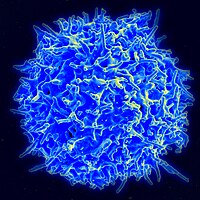
Photo from wikipedia
The field of innate immunity is witnessing a paradigm shift regarding “memory” and “programming” dynamics. Past studies of innate leukocytes characterized them as first responders to danger signals with no… Click to show full abstract
The field of innate immunity is witnessing a paradigm shift regarding “memory” and “programming” dynamics. Past studies of innate leukocytes characterized them as first responders to danger signals with no memory. However, recent findings suggest that innate leukocytes, such as monocytes and neutrophils, are capable of “memorizing” not only the chemical nature but also the history and dosages of external stimulants. As a consequence, innate leukocytes can be dynamically programmed or reprogrammed into complex inflammatory memory states. Key examples of innate leukocyte memory dynamics include the development of primed and tolerant monocytes when “programmed” with a variety of inflammatory stimulants at varying signal strengths. The development of innate leukocyte memory may have far‐reaching translational implications, as programmed innate leukocytes may affect the pathogenesis of both acute and chronic inflammatory diseases. This review intends to critically discuss some of the recent studies that address this emerging concept and its implication in the pathogenesis of inflammatory diseases.
Journal Title: Journal of Leukocyte Biology
Year Published: 2017
Link to full text (if available)
Share on Social Media: Sign Up to like & get
recommendations!